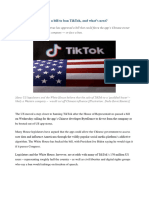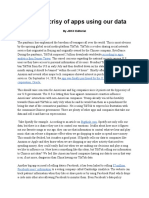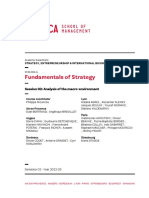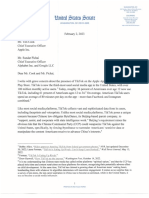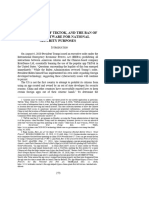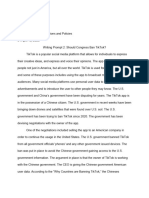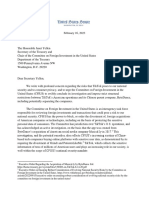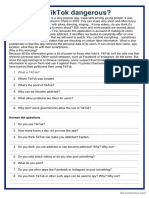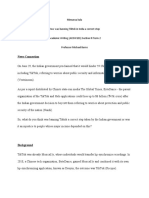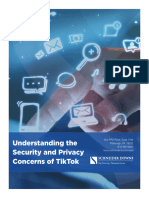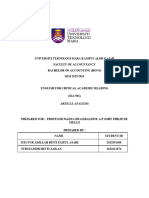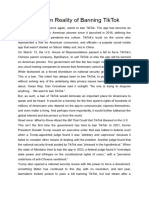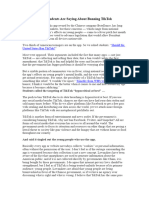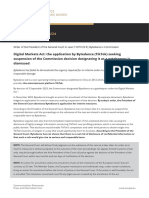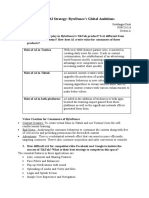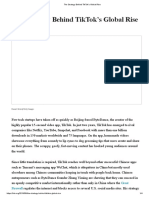1.
Question Set 1:
- This text was published in a peer-reviewed academic source journal (The Guardian - a
British daily newspaper, founded in 182. It is also considered as a newspaper of record in
the UK). The rating of this journal according to Ad Fontes Media ratings methodology
+Reliability : 41.93
+Bias : - 8.34
- This text was published on March 17th 2023. It updated information about Tiktok's
elimination in the UK as soon as it occurred.
2. Question Set 2:
- There are 2 authors of this article : Dan Milmo and Alex Hern.
+Dan Milmo: is the Guardian's global technology editor from 2021 . He has worked for the
Guardian for 17 years including 10 years in Guardian News and Media. He also wrote for
Yahoo News, Irish Times.
+Alex Hern : is the UK technology editor for the Guardian. He is an entrepreneur in the
field of early stage or incubation of technology. He is the founder and co-CEO of Tsunami
XR ( a leader in immersive software and content solutions for the enterprise market.)
The Guardian, https://www.theguardian.com/profile/danmilmo
https://www.theguardian.com/profile/alex-hern
Linkedin, https://uk.linkedin.com/in/dan-milmo-1a20336
https://www.linkedin.com/in/alexhern
Muck Rack, https://muckrack.com/alexhern
- This article is objective. It presented a balanced view about the topic.The authors have
pointed out reasons why TikTok has been banned in UK's government phones and in the
US. They also discussed the wonders of the manipulation algorithm of TikTok. They only
gave information and explanations, not presented their biases.
3. Question Set 3:
This text was written for a general audience. This article doesn't include many academic
terms in technology. Besides, the problem about TikTok is a hot potato in recent days, it has
received the concerns and mixed reactions from the public. That's the reason why this article
is written for a general audience.
The author wrote this article to contribute knowledge and report information about the topic
(TikTok's ban in UK's government phones)
4. Question Set 4:
The author doesn’t present his opinion about the topic in the text
� The text presents convincing or reliable information about its topic because the author
gives: report, statistics clearly and reliable sources.
"According to a report by the Australian-US cybersecurity firm Internet 2.0, Tiktok's app
can access a user's calendar, other running applications, wifi networks, and even the sim
card serial number." (Report)
TikTok says ByteDance is 60% owned by external investors including the US private equity
firm KKR, 20% by its employees and 20% by its founders, Zhang Yiming and Liang
Rubo”, “more than 1 billion people consuming its short video posts around the
world”( Statistic)
5. Question Set 5:
The author hasn’t done empirical research about the topic
The author use such as types of evidence as:
+ Anecdotes:“In 2022, a BuzzFeed investigation revealed a rash of situations in which
engineers in China would have access to US data, lasting at least until January 2022. The
data was "stored" in the US, but with access controls that allowed staff elsewhere to access
controls, according to the investigation.”
→ To show cases that Chinese workers could approach data in the US. That explains
why the US government doubts about the data stealing of the TikTok app.
Statistic: “TikTok says ByteDance is 60% owned by external investors including the US
private equity firm KKR, 20% by its employees and 20% by its founders, Zhang Yiming
and Liang Rubo”, “more than 1 billion people consuming its short video posts around the
world”
→ Show that TikTok isn't owned completely by Chinese corporations but also by
foreign companies (including USA). For that reason TikTok stated that the Chinese
state can't control the activation and data of TikTok users.
+ Quotations : “The bottom line is that if there is a cybersecurity issue for the government
users, the same applies to all of us,” says Alan Woodward, a professor of cybersecurity at
Surrey University, Referring to similar bans by the US, Canada and the European
Commission, the UK government said: “The government, along with our international
partners, is concerned about the way in which this data may be used.
→To demonstrate the necessity of prohibiting TikTok in phones of workers in other
important fields (journalism, medical, legal) if TikTok truly has problems with data
and security policy.
The evidence was used convincingly and effectively to enhance arguments of the authors.




